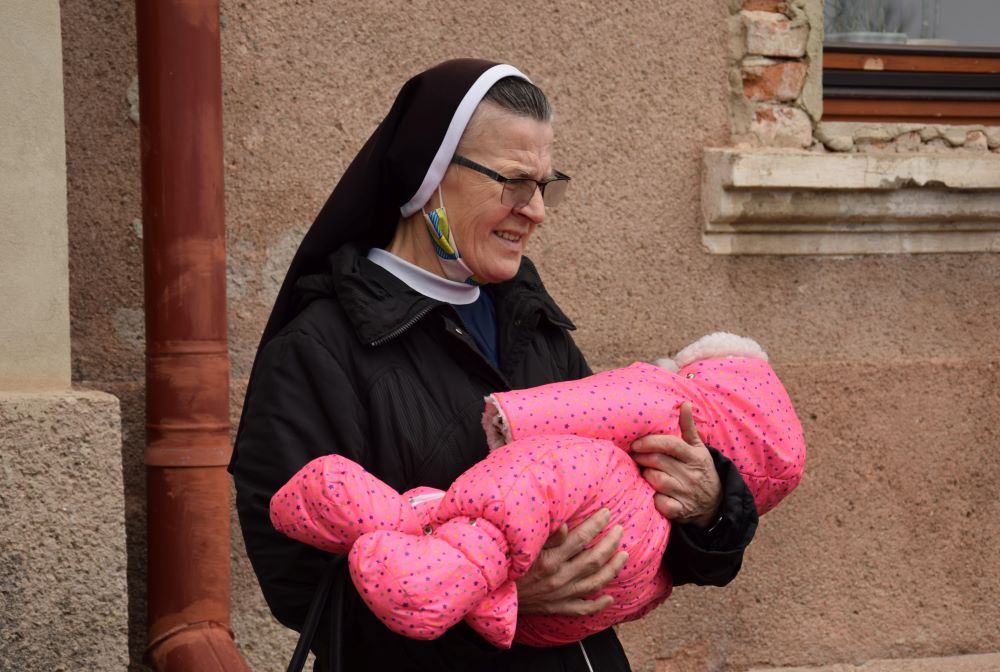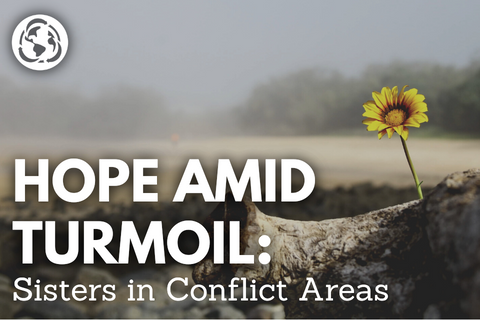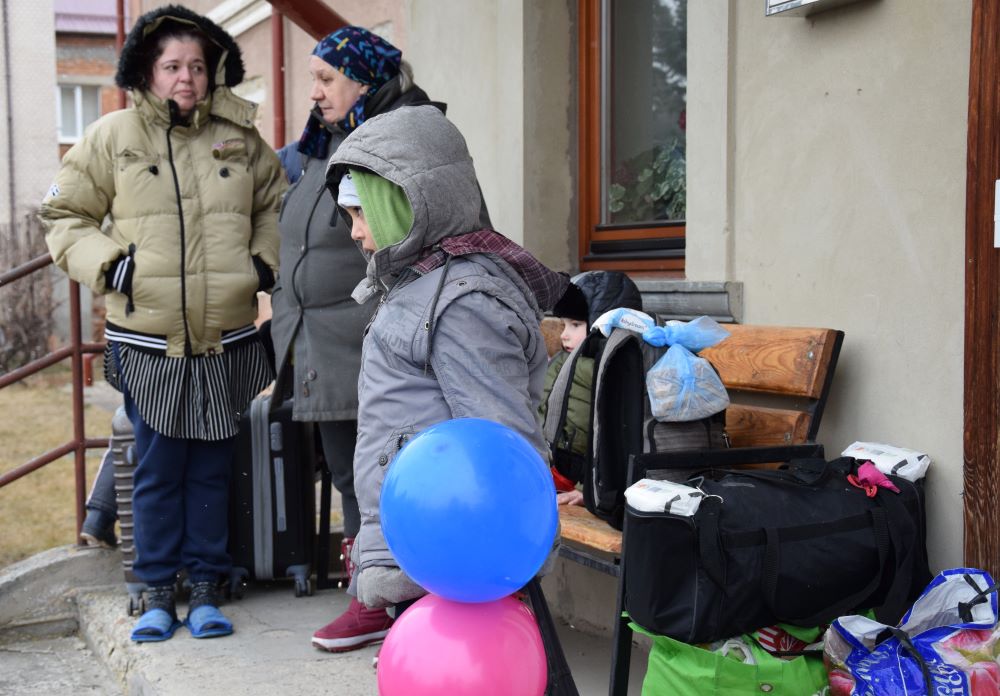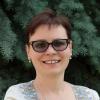
This sister came from Kharkiv to help Ukrainians displaced by the war. The Institute of Theological Sciences leaders quickly created a makeshift bomb shelter, dorm and cafeteria. (Courtesy of Iryna Saszko)
Editor's note: Global Sisters Report's new series, Hope Amid Turmoil: Sisters in Conflict Areas, offers a look at the lives and ministries of women religious serving in dangerous places worldwide. The news stories, columns and Q&As in this series will include sisters in Ukraine, Nigeria, Kenya, Sri Lanka, Nicaragua and more throughout 2023.

I still had time to talk with my students about the main theses of the Decree on Ecumenism of the Second Vatican Council, and explain the principles of the hierarchy of the truths of faith. I even said that according to the tradition of Eastern theology, evil and suffering create an epicletic situation for a person that forces him to call upon the Holy Spirit-Comforter, to beg for healing and life. However, this time the young theologians did not go too deep into these ideas. War hung in the air; some believed in it, some did not, but everyone was very afraid of it.
Unfortunately, our worst fears came true. On Feb. 24, 2022, with the sounds of the first bombings, the students hurriedly left for home. The rector, the vice rector, a few other employees and I went to the basement to set up a bomb shelter in our Institute of Theological Sciences of the Immaculate Virgin Mary (the former monastery of the Sisters of Mercy.)
The very next day, our institute, located in the town of Horodok in Ukraine's Khmelnytskyi region, turned into a real volunteer center. Refugees began to arrive from everywhere — first from Gostomel, Bucha, Kyiv, and later from Mykolaiv, Kherson and Sloviansk. Very quickly, the classrooms of the institute became a place to spend the night, the library turned into a game room and the student cafeteria became a corner for conversations about God. Mothers' tears mingled with children's laughter, and the sounds of pets mingled with organ music flowing from the institute's chapel.
One day the Orionist sisters came from Kharkiv with 20 children and their single mothers, as well as orphaned boys who were cared for by social workers of the Catholic public organization Emaus. Among them was Recardo D'Alessandro, an Italian volunteer teacher, and Maxim, a social psychologist from Mariupol.
A family with a newborn came to us from Mariupol. The boy was born on March 4, in a maternity hospital with no light. During the delivery, the nurse used her phone's flashlight to provide light for the doctor. The next day, the family went home — a few hours before a rocket hit the hospital.

People displaced by Russia's attacks on Ukraine began arriving at the Institute of Theological Sciences of the Immaculate Virgin Mary the day after the war started. They came first from Hostomel, Bucha, Kyiv, and later from Mykolaiv, Kherson and Sloviansk. (Courtesy of Iryna Saszko)
An elderly couple, professors of artificial intelligence from one of the Kharkiv universities, had stayed in their basement for more than a month, until a priest friend took them out of Kharkiv to Horodok, almost by force.
These are just a few examples from many tragic stories. Shootings, rapes and looting are among the experiences that these new residents of the institute survived. However, people are reluctant to talk about their experiences. The memories hurt, as does the awareness that they have nowhere to return. As they did 80 years ago during World War II, again they ask about the presence of God in their suffering. The question "Where was God in Auschwitz?" is changed only to "Where is God in Mariupol and Bucha?" What is the meaning of life in the middle of what seems to be an explosion of hell?
Viktoria and Vasyl Mytsenky liked to work on their piece of land, growing watermelons and wheat. They had a small farm and a cozy house in the village 180 kilometers (112 miles) from Kherson. The first battle in their area took place March 13. The Russians entered their home, led them room to room at gunpoint, robbed them of everything and then riddled their car with bullets. The Russians explained that it was because new times have come — times of true peace and freedom! From this "freedom," the Mytsenkos fled — under fire — to Horodok on an old tractor. Someone gave them the rector's phone number.
Viktoria and Vasyl Mytsenky fled their home after Russians entered their home and threatened and robbed them. After staying at the Institute of Theological Sciences, the couple, together for 35 years, celebrated a church wedding on Easter. (Courtesy of Iryna Saszko)
"The institute has become our new home. The horrors of war, fear and grief brought us to the place where the Lord showed us his love. Maybe it sounds strange, but everything in our life makes sense," shared Viktoria. "It's hard for me to understand how people can nurse such evil, but if it weren't for the war, I wouldn't have met Jesus," cried Vasyl.
And indeed, frequent spiritual conversations with priests and consecrated women, the possibility of daily Holy Mass, adoration and the rosary, as well as the love with which the employees of the institute surrounded internally displaced people convinced them, little by little, that human kindness is the strongest argument for the existence of God.
Apparently, the last push for Viktoria and Vasyl were the Lenten retreats, which we organized for everyone. Reflections on the death and resurrection of Jesus Christ prompted them to marry in the church after 35 years of living together. It took place during the Easter liturgy, when the residents of the institute organized a real wedding for them on the feast of the resurrection.
At the beginning of autumn, Vasyl and Viktoria returned to their native village, which was "de-occupied" by the Armed Forces of Ukraine. Little by little they are renovating their house. They cultivated the land on the unmined parts of their fields. In the yard, Viktoria planted roses that she had taken from here in Horodok.
Advertisement
The Mytsenkys call us almost every week and send photos and postcards. Viktoria and her granddaughter also came for our Christmas meeting. She rejoiced, cried and glorified God. She presented all the employees with hand-knitted items. I got a lovely pink scarf. There is no more hatred in her eyes. Only pain and light, and a wonderful thirst for God, whom she met in the middle of the war. "Everything makes sense! Everything makes sense," she never tires of repeating, clutching a wooden rosary in her hands.
Now she and her husband have a new dream: to build a small chapel in honor of the Mother of God in front of their house. And in summer, they want to invite all the employees of the institute to come to them for watermelons. For now, it's just a dream.
However, as Missionary Oblate Fr. Wacław Hryniewicz, the Polish theologian, writes, the innocent never suffer alone. The blood of the Paschal Lamb restores harmony in this world. His sacrifice does not justify evil, it only gives meaning to every human suffering.
And so, dreams definitely come true. "Hope will not put you to shame, because the love of God has been poured into our hearts by the Holy Spirit who has been given to us" (Romans 5:5).







